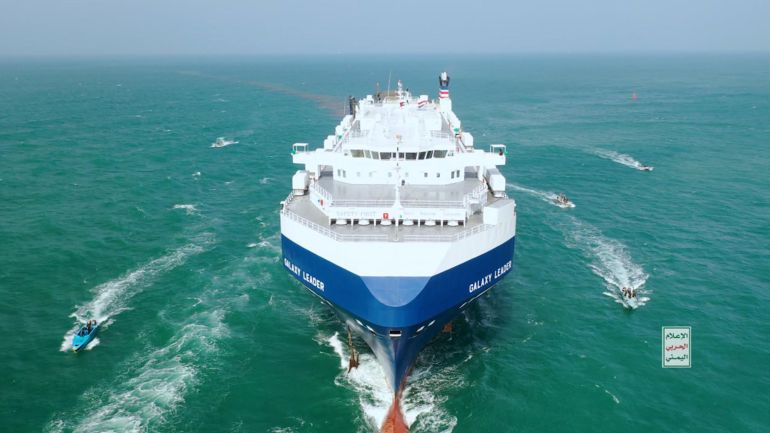Energy markets are beginning to take notice of non-stop assaults on Israeli-linked shipping.
Hijackings, missile strikes and drone assaults on ships by Yemen’s Houthi rebels have forced AP Moller-Maersk, a Danish shipping and logistics giant, and Hapag-Lloyd, a German shipping and container transportation company, to pause shipments through the Red Sea.
Their decisions, announced on Friday, are a sign that major corporations are taking the security situation in the Red Sea increasingly seriously. But the consequences might also be felt by the world’s oil markets and the cost of energy that consumers need to bear – though the extent of any disruption might depend on how major global players respond to the looming crisis, said experts.
Maersk said in a statement that its decision stemmed from the company’s concerns about the “highly escalated security situation in the southern Red Sea and Gulf of Aden” over the past few weeks. Recent missile and drone attacks on commercial vessels represent a “significant threat to the safety and security of seafarers,” it said.
Maersk and Hapag-Lloyd together operate almost a quarter of the world’s shipping fleet.
The growing insecurity in the Red Sea is a result of Israel’s war on Gaza which began on October 7. Since Israel’s bombardment of the Palestinian enclave began 10 weeks ago, the Houthis have attacked at least eight ships in the Bab el-Mandeb, the strait separating Eritrea and Djibouti on one side from the Arabian Peninsula on the other.
Only 29km (18 miles) wide at its narrowest point, the Bab el-Mandeb is a vital route for international trade –10 percent of the world’s seaborne crude flows through this strait – meaning any disruptions become a global problem.
The Houthis have been targeting vessels which are at least partly owned by Israelis or by anyone shipping cargo to Israel via the Red Sea. In November, the group said it had taken over the Galaxy Leader cargo ship, which it claimed was Israeli owned. But Israel described it as a British-owned and Japanese-operated cargo vessel with no Israeli nationals on board. That ship was headed for India.
The rebels, who have been in control of large parts of Yemen since 2014, have promised to continue carrying out such attacks until a full ceasefire is implemented in Gaza. This is part of a strategy aimed at raising the costs for the US and others of supporting Israel in various ways.
Such hostilities also serve to demonstrate that the Houthis are a force with staying power in Yemen and an increasingly bold and determined part of the so-called “axis of resistance”. This also includes Hamas in Gaza, Lebanon’s Hezbollah, the Syrian government and various Syrian and Iraqi non-state actors backed by Tehran.

Oil market ‘taking more notice’
There is little to suggest that the Houthi attacks will stop any time soon. What does that mean for the oil market?
Credit: Source link
